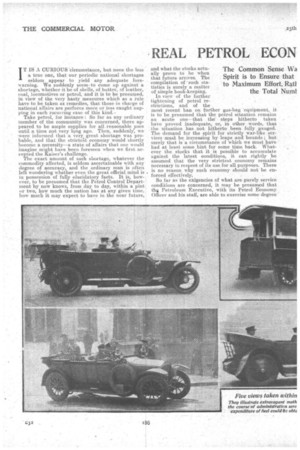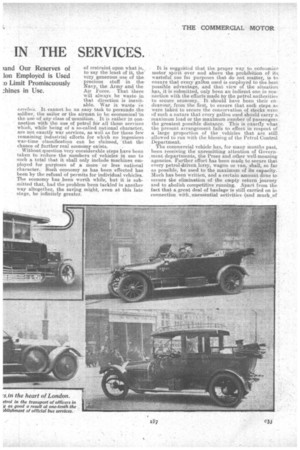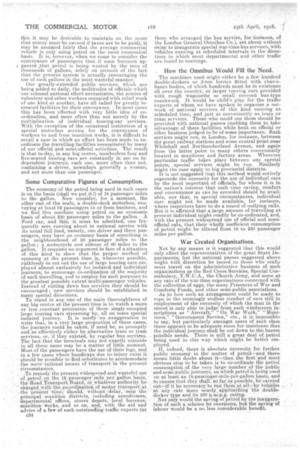REAL PETROL ECON IN THE SERVICES.
Page 10

Page 11

Page 12

If you've noticed an error in this article please click here to report it so we can fix it.
The Common Sense Wa Spirit is to Ensure that to Maximum Effort, Ratf the Total Nurnt
rand Our Reserves of Ion Employed is Used -co Limit Promiscuously :hines in Use. IT IS A CURIOUS circumstance, but none the less a true one, that our periodic national shortages seldom , appear to yield any adequate forewarning. We suddenly seem, to come up against a shortage, whether it be of shells, of butter, of leather, coal, locomotives or petrol, and it is to be presumed, in view of the very hasty measures which as a rule have to be taken as remedies, that those in charge of national affairs are perforce more or less caught napping in each recurring case of this kind..
'rake petrol, for instance : So far as any ordinary member of the community was concerned, there appeared to be ample supplies for all,rea,sonable uses until a time not very long ago. Then, suddenly, we were informed that a very great shortage was probable, and that the strictest economy would shortly become a necessity--a state of affairs that one would imagine might have been foreseen when we first ac cepted the Kaiser's challenge. The exact amount of such shortage, whatever the commodity affected, is seldom ascertainable with any degree of accuracy, and the ordinary man is often left wondering whether even the great official mind is in possession of fully -elucidatory facts. It is, however, to be presumed that the Petrol Control Department by now knows, from day to day, within a pint or two, how much the nation has at any given time, how much it may expect to have in the near future, and what the stock-s actually prove to be when that future arrives: The compilation of such statistics is surely a matter of simple book-keeping.
In view of the further tightening of petrol restrictions., and of the most recent bin on further gas-bag 'equipment, it is to be presumed that the petrol situation remains an acute one—that the steps hitherto taken have proved inadequate,. or, in other words, 'that the -situation has not hitherto .been fully gauged. The demand for the spirit for strictly war-like services -must be increasing by leaps and bounds ; but surely that is a circumstance of which we must have had at least some hint for some time back. Whatever the stocks that it is possible to accumulate against the latest conditions, it can .rightly be assumed that the very strictest .economy remains necessary in respect of its use for all purposes. There is no reason why such economy should not be enforced effectively.
So far as the exigencies of what are .purely service conditions are concerned, it may be presumed that thg Petroleum Executive, with its Petrol Economy Officer and his staff, are able to exercise some degree
of restraint upon what is, to say the least of it, the very generous use of the. precious stuff in the Navy, the Army and the Air Force. That there will alwaysbe waste in that direction is inevitable. War is waste in excelsis. It cannot be an easy ta-sk to persuade the
soldier, the sailor or the airman to be economical 'in the use of any class of munition. , It is rather in con nection with the use of petrol for all those services which, while being of a so-called national character, are not exactlY war services, as well as for those few remaining industrial efforts for which no ingenious war-time classification can be claimed, that the chance of further real economy exists. .
• Without question Very considerable steps have been taken to reduce the numbers of vehicles in use to such a total that it shall only include machines employed for purposes of .a more or less national character. Such economy as has been effected has been by the refusal of permits for individual vehicles. The economy has been worth while, but it is submitted that, had the problem been tackled in another way altogether, the saving might, even at this late stage, be infinitely greater. It is suggeStud that the proper way to .ecdnoinize motor spirit over and above the prohibition of its wasteful use lot purposes that do not matter, is to ensure that every gallon used is employed to the best possible advantage, and that view of the situation his, it is submitted, only been an indirect one in connection with the efforts made by the petrol authorities to secure economy. It should have been their endeavour, from the first, to ensure that such steps as were taken to secure the conservation of stocks were of such a nature that every gallon used should carry a maximum load or the maximum number of passengers the greatest possible distance. This is exactly what. the present arrangement fails to effect in respect of a large proportion of the vehicles that are still allowed to run with the blessing of the Petrol Control Department.
The commercial vehicle has for many months past, been receiving the unremitting attention of Government departments, the Press and other well-meaning agencies. Further effort has been made to secure that. every petrol-driven lorry, wagon or van, shall, so far as possible, be used to the maximum of its capacity. Much has been written, and a certain amount clone to secure the elimination of the empty return journey and to abolish competitive running. Apart from the fact that a great deal of haulage is still carried on in connection. with, unessential activities (and rnuch,,of this it, may be desirable to Maintain on the score that money mast be earned if taxes are to be paid), it may be assumed fairly that the average commercial vehicle is only using petrol on the most economical basis. It is, flowerer, when we come to consider the conveyance ofpassengers that it soon becomes apparentethat petrol is being wasted by the tens of thousands of _gallons, solely on account of the fact that the present. system is actually encouraging the use of such gallons in the mcist wasteful manner.
Our greatly-extended public services, which are _being added to daily, the multitudes of officials. which our colossal national effort necessitates, the armies of Volunteer and other workers occupied with relief work of one kind or another, have all called for greatly increased facilities for their conveyance. In most cases this has been effected with very little idea of coordination, and more often than not merely by the multiplication of individual touring-car services. With the exception of the occasional institution of a special motorbus service for the conveyance of workers to and from Munition works, it is difficult to recall a case in which an effort has been made to coordinate the travelling facilities necessitated by many of our official and semi-official activities. The result is that to-day, in any big centre, numberless four and five-seated touring cars are constantly in use on independent journeys, each one, more often than not, containing a driver, nowadays generally a woman, and net more than one passenger,
Some Comparative Figures of Consumption.
The economy of the petrol being used in such cases is on the basis (shall we put it?) of 18 passenger miles to the gallon. Now consider, for a moment, the ether end of the scale, a double-deck motorbus, con. veying at least 32 passengers to or from business, and we find this machine using petrol on an economic basis of about 230 passenger miles to the gallon. .A Ford car, and this, it must he admitted, one frequently sees running about in national service with its usual full load, namely, one driver and three passengers, may have an economy basis of something in the neighbourhood, of 50 passenger miles to the gallon ; a motorcycle and sidecar of 60miles to the gallon. It requires no argument in face of a situation of this kind to show that the proper method of economy at the present time is, whenever possible, ruthlessly to cut out the use of large touring cars employed 'almost exclusively for isolated and individual Journeys, to encourage co-ordination of the majority of such travelling, and to employ for such purposes to the greatest possible extentinulti-Passenger vehicles. Instead of Cutting down bus services they should be • encouraged • new services should be established in many special directions. To stand. in any one >of the main thoroughfares of any big centre at the-present time is to watch a more or less ;constant procession of these singly-occupied large touring cars streaming by, all onsome special isolated journey. It is surely no exaggeration to write that, in a, very large proportion of these cases, the journeys could be taken,if need be, as .promptly and as effectively either by,alternative train or train services, or, if they existed, by regular -bus services. The fact that the terminals may not exactly coincide inall these cases may be a matter of little moment. Most of the passengers have the use of-their legs, and in .a few cases where handicaps due to-injury exist it should be possible to find-substitutes to accommodate' -the move rational means of transport in the present
'ircumstances. •
-.To remedy the present widespread and wasteful use of petrel_ en the 18.. passenger ..mile per gallon basis, the Itoad_Transport-Roard, or .whatever authority beeharged:withSthe .co,ordinittion of motor transport at._ the preient, time; Should, without delay, . map the priecipal, munition districts, including aerodromes,
• departmental offices, stores depots, -local bureaus, •
munition -Works), and so On, and, with the aid and advice of a, few of such. outstanding traffic experts (as c34 those who arranged the bus Service, for instance of the London General Omnibus Co.), set, about without delay to inaugurate special war-time bas services, with vehicles running at scheduled intervals in the directions in which most departmental and other traffic are found to converge.
How the Omnibus Would Fill the Need.
The machines used might either be a few hundred double-deckers or 2-ton lorries fitted with char-as banes bodies, of which hundreds must be in existence all over the country, or larger touring cars provided with rough ag on et t e or small covered bus-type coachwork. It would be child's play for the traffic experts of Whom we have spoken to organize a network of national services of this kind running at scheduled time, and just a-s conveniently as train .or tram services. Those who could use them should be provided with national passes enablirig them to take advantage of these facilities while beat on official or other business judged to be of some importance. Suchservices might run, in London, for instances between the great railway stations and some central point near Whitehall and Northumberland Avenue, and again from the latter point to many others conveniently located in munitions and factory areas. Wherever particular traffic takes place between any special points, special. services' niight be run. Similarly might the case apply to big provincial districts.
It is not suggested that this method would entirely supersede the necessity for the use of individual cars • by the most important of officials, for whom it is in the nation's interest that such -time saving, comfort a-nd convenience as ca-n be accorded should be available, nor that, in special circumstances, individual cars might' not be made available for instance, where inspectors have to doa round a outlying calls. But it is affirmed that a large amount of travelling at present individual might readily be co-ordinated, and, with the present widespread use of official and semiofficial ears, that their wholly inefficient consumption of petrol might be altered from 18 to 230 passenger miles per gallon.
War Created Organizations.
Not by any means is it suggested that this.would only affect the representatives of the great State Departments; but the national passes suggested above might, with discretion be issued to those who really must travel on the administrs.tive business of such organizations as the Red Cross Services,-Special Constabulary, Y.W.C.A., the Church Army, and some at any rate of the war-time organizations concerned with the collection of eggs, the many Prisoners of War and Comforts Funds and other semi-public associations.
As-to how such an arrangement could be made to rope in the seemingly endless number of care still in employment of the necessity of which the man in the street is only able to judge from such windscreen inscriptions as " Aircraft,' " On War Work," ." Munitions," "Government Service," etc., it is impossible to say, but particularly amongst users of such class there appears to be adequate room for insistence that, the individual journeyshall he cut down to the barest possible needs.There is still a great deal -of petrol being used in this way 'which might be better employed. .1f, indeed, there is absolute necessity for further public economy in the matter of Petrol—and there seems little doubt about it—then the first and most obvious step to be taken is to co-ordinate the petrol consumption of .the very large number of the public and semi-public journeys, on .which petrol is being used . on at least an 18-passanger7milesper-gallon basis, and to ensure that they shall, ea far as possible, be carried out-if it be necessary to run..thein alsall=by vehicles . at .anY rate more nearly ;approaching the double
decker type and its 230 pan.p.g. rating.• • _
Not cinly would the saving of petrol by the inangura. lion of shell a scheme be enormous, but the S.atving of labour would be a, no less Considerable benefit.






















